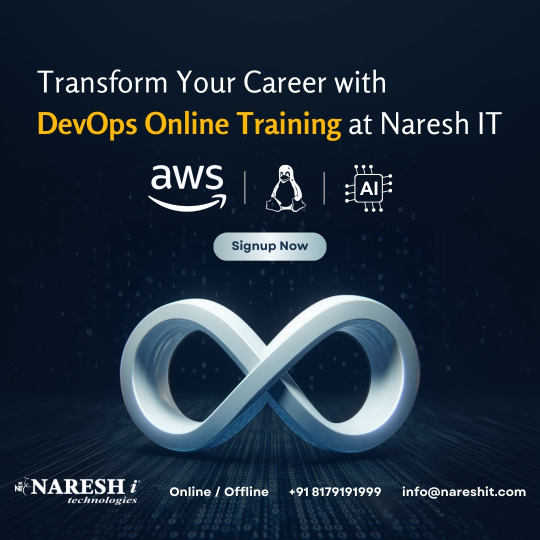#DevOps Training Online
Text
DevOps Online Training | AWS DevOps Training
Best DevOps Tools: The Comprehensive List | 2024
DevOps tools are crucial for automating and streamlining the software development lifecycle, facilitating collaboration between development and operations teams, and ensuring the continuous delivery of high-quality software. Here's a comprehensive list of the best DevOps tools in 2024, categorized by their primary function:

1. Version Control Systems (VCS)
Git: The most popular distributed version control system, widely used for source code management.
Git Hub: A cloud-based hosting service for Git repositories with added features for collaboration and CI/CD.
Git Lab: Another Git repository manager that includes built-in CI/CD and project management features.
Bit bucket: Atlassian's Git solution, which integrates seamlessly with other Atlassian products.
2. Continuous Integration/Continuous Deployment (CI/CD)
Jenkins: One of the most popular open-source CI/CD tools, known for its vast plugin ecosystem.
CircleCI: A cloud-based CI/CD service that supports fast, efficient builds and deployments.
Travis CI: A CI service integrated with GitHub, popular for open-source projects.
GitLab CI: Integrated within GitLab, it offers CI/CD pipelines directly from your Git repositories.
Azure DevOps: A cloud service from Microsoft that provides CI/CD pipelines, along with other DevOps services.
3. Configuration Management
Ansible: An open-source automation tool for configuration management, application deployment, and task automation.
Puppet: A configuration management tool that helps manage infrastructure as code.
Chef: Another configuration management tool that automates infrastructure provisioning.
SaltStack: Known for its speed, SaltStack manages large-scale infrastructure and can perform tasks in milliseconds.
4. Containerization
Docker: The most popular containerization platform, allowing developers to package applications into containers.
Kubernetes: A container orchestration tool that automates the deployment, scaling, and management of containerized applications.
Open Shift: Red Hat's enterprise Kubernetes platform, with added developer and operational tools.
Rancher: A container management platform that simplifies running Kubernetes clusters.
5. Infrastructure as Code (IaC)
Terraform: An open-source IaC tool that allows users to define and provision data center infrastructure.
AWS Cloud Formation: Amazon’s IaC tool, used to model and set up AWS resources.
Azure Resource Manager (ARM): Microsoft's IaC service for managing Azure resources.
Pulumi: A modern IaC tool that supports multiple languages and cloud platforms.
6. Monitoring and Logging
Prometheus: An open-source monitoring and alerting toolkit, often used with Kubernetes.
Grafana: A visualization tool that works with Prometheus and other data sources for monitoring dashboards.
ELK Stack (Elasticsearch, Logstash, Kibana): A powerful suite for log management and analysis.
Splunk: A commercial solution for searching, monitoring, and analyzing machine-generated data.
Datadog: A cloud-based monitoring and analytics platform for IT infrastructure, applications, and logs.
7. Collaboration and Communication
Slack: A messaging platform that integrates with various DevOps tools for team communication.
Microsoft Teams: A collaboration tool that integrates with the Microsoft ecosystem, including Azure DevOps.
Trello: A project management tool used for tracking tasks and project progress.
Jira: Atlassian's tool for agile project management, integrating well with other development tools.
8. Security
Snyk: A security tool that helps developers find and fix vulnerabilities in open-source dependencies.
Aqua Security: A security solution for securing containerized applications.
SonarQube: A tool for continuous code quality and security inspection.
HashiCorp Vault: A tool for securely managing secrets and sensitive data.
9. Artifact Management
Nexus Repository: A repository manager for storing and managing build artifacts.
JFrog Artifactory: A universal artifact repository manager that integrates with CI/CD tools.
Harbor: An open-source container image registry that secures and manages Docker images.
10. Testing
Selenium: A popular framework for testing web applications.
JMeter: A tool for performance testing web applications and other services.
SonarQube: Besides security, it's also used for continuous inspection of code quality.
Visualpath is the Leading and Best Software Online Training Institute in Hyderabad. Avail complete DevOps Training Worldwide. You will get the best course at an affordable cost.
Attend Free Demo
Call on - +91-9989971070
Visit: https://visualpathblogs.com/
WhatsApp: https://www.whatsapp.com/catalog/919989971070
Visit https://www.visualpath.in/devops-online-training.html
#DevOps Training#DevOps Online Training#DevOps Training in Hyderabad#DevOps Online Training in Hyderabad#DevOps Training Online#DevOps Training in Ameerpet#DevOps Training Institute in Ameerpet#DevOps Online Training institute Hyderabad#DevOps Certification Training in Hyderabad#AWS DevOps Course Online Hyderabad#AWS DevOps Online Training#AWS DevOps Training
0 notes
Text
You can become knowledgeable in DevOps principles like Continuous Integration (CI), Continuous Deployment or Continuous Delivery (CD), and Continuous Monitoring by taking the online training for the Mastering Azure DevOps Certification. Training is provided for sprint planning and tracking, azure repos, azure pipelines, unit testing with vb.net, azure test plans, azure artefacts, and azure extensions for azure devops. To practise Azure DevOps, the curriculum was created by Microsoft MVPs and DevOps experts.
0 notes
Text
10 Reasons You Should Get Your devops training online.
The demand for skilled DevOps professionals is on the rise, making DevOps training more important than ever. And while there are many ways to get DevOps training, taking an online course is often the most convenient and flexible option.
Here are 10 reasons why you should get your DevOps Training Online:
1. You can learn at your own pace.
2. You can learn from anywhere in the world.
3. You have access to a wide range of courses.
4. You can choose courses that fit your schedule.
5. You can learn from experts in the field.
6. You can get feedback and support from other learners.
7. You can learn new skills and knowledge.
8. You can improve your career prospects.
9. You can get certification.
10. You can learn about the latest trends and technologies.
In the world of software development, there is always a need for new processes and methodologies that can help to streamline workflows and improve efficiency. DevOps is a set of tools, practices, and philosophies that aim to do just that.
The demand for DevOps professionals is growing at a rapid pace, and it is only set to increase in the coming years. If you are looking for a new career challenge, then DevOps might be the perfect field for you.
0 notes
Text
Is Getting AWS Certification A Good Idea?
If you are at a point in life when you need good career advice for yourself, then AWS certification training will be best for you to go with. But before you decide to do it, there are few crucial things to know about it. Is it a good idea? Does it have a future? Will it provide lucrative career options?
All of these questions along with associated questions get answered in the article below.
The Behemoth that is Amazon
People around the world have a strong impression on Amazon and they believe that, it is here to stay. This is because Amazon owns AWS and it is a platform that offers undeniable advantages of cloud computing, it can be tempting to go in and get your AWS training and certification. It is the leader in cloud computing technology and diving into it can be lucrative, to say the least.
AWS doesn’t just only offer software, but also a platform as well as the cloud computing technology.
What AWS can Give You
Let’s look at some of the advantages of AWS certification.
Career Flexibility
If you are looking for a lot of flexibility in your career, then choosing the AWS is a great idea. It is a mature provider of cloud computing technology and offers cutting-edge tools that will make your career shine.
With DevOps training online and AWS training, you can get ahead of your counterparts in managing, and developing future-ready cloud services. Whether it is finance, retail, government, or another sector, there is a huge amount of flexibility that will be in store for you if you start.
Get Paid More
Another thing that such certification can give you, is better-paid jobs. After all, you are getting training for a better pay package, right? So, with AWS training, it can be just another thing that will help you to get paid more and get established in life so much earlier.
If your mind is set on the various aspects of Information technology, you will find that this is the certification that will help you to earn more bucks.
Greater Career Progression
Perhaps there is nothing more dreary than getting stuck on a single job profile for many years. While this may seem nice with a good pay package, for indivisuals who want more out of life, this can be far from exciting. With AWS training and certification, concentrate on making the most out of your career progression goals.
Be a Member of the Cloud Computing Generation
Cloud computing is ready for the future and it is where people will be in the coming few years. Get yourself the career of your dreams by trying out an AWS certification course and see the difference it makes to your network. You will be part of the lucrative sector that has shaken up the world.
If you are choosing a career path, this can be just the thing to get into for long-term career growth and progression.
1 note
·
View note
Text

Boost your career with hands-on DevOps Online Training. Learn from industry experts and gain practical skills to become a DevOps pro. Enroll in our DevOps Online Training to get certified and accelerate your career!
#devops#DevOpsOnlineTraining#LearnDevOps#devops certification#DevOps Courses#DevOps Career#online training#devops engineer#devops tools#devops automation#DevOps Cloud#DevOps Best Practices#DevOps Hands-on Training#DevOps for Beginners
0 notes
Text
What should I study to get AWS certification?
To prepare for an AWS certification, you'll need to study a combination of AWS-specific knowledge and general cloud computing concepts. Here’s a guide on what to study based on the certification you’re aiming for:
1. AWS Certified Cloud Practitioner
Target Audience: Beginners with no prior AWS experience.
What to Study:
AWS Global Infrastructure
Basic AWS services (EC2, S3, RDS, VPC, IAM, etc.)
Cloud concepts and architecture
Billing and pricing models
Basic security and compliance
2. AWS Certified Solutions Architect – Associate
Target Audience: Those with some experience designing distributed applications.
What to Study:
AWS core services in-depth (EC2, S3, VPC, RDS, Lambda, etc.)
Designing resilient architectures
High availability and fault tolerance
AWS best practices for security and compliance
Cost optimization strategies
AWS Well-Architected Framework
3. AWS Certified Developer – Associate
Target Audience: Developers with some experience in AWS.
What to Study:
AWS services used for development (Lambda, DynamoDB, S3, API Gateway)
Writing code that interacts with AWS services
AWS SDKs and CLI
Security best practices for development
Deployment strategies (CI/CD, CodePipeline, etc.)
4. AWS Certified SysOps Administrator – Associate
Target Audience: System administrators with some experience in AWS.
What to Study:
AWS operational best practices
Monitoring and logging (CloudWatch, CloudTrail)
Automation using CloudFormation and OpsWorks
Networking and security on AWS
Troubleshooting AWS environments
Backup and recovery methods
5. AWS Certified Solutions Architect – Professional
Target Audience: Experienced Solutions Architects.
What to Study:
Advanced networking topics
Complex architecture design patterns
Migration strategies and methodologies
Cost management and optimization
Advanced AWS services (RedShift, Kinesis, etc.)
AWS Well-Architected Framework in depth
6. AWS Certified DevOps Engineer – Professional
Target Audience: DevOps engineers with extensive AWS experience.
What to Study:
Continuous integration and continuous deployment (CI/CD)
Monitoring and logging strategies
Infrastructure as Code (CloudFormation, Terraform)
Security controls and governance
Automated incident response
High availability and fault tolerance
7. AWS Certified Security – Specialty
Target Audience: Security professionals.
What to Study:
AWS security services (IAM, KMS, WAF, etc.)
Data protection mechanisms
Incident response
Logging and monitoring on AWS
Identity and access management
Compliance and governance
Resources for Study:
AWS Free Tier: Hands-on practice with real AWS services.
AWS Whitepapers: Official documents on best practices.
AWS Documentation: Detailed guides on each service.
Online Courses: Platforms like A Cloud Guru, Udemy, Coursera.
Practice Exams: To get a feel of the actual exam environment.
AWS Certified Study Guide Books: Available for different certifications.
Tips:
Gain hands-on experience with AWS services.
Focus on understanding concepts rather than memorizing facts.
Use AWS's official resources and recommended third-party courses.
Regularly take practice exams to assess your readiness.
Let me know if you need more information on any specific certification!
#online certification and training#online training course#awscertification#awscourse#awstraining#awscertificationanadtraining#aws devops training#aws course#aws cloud#aws certification#aws certification and training
0 notes
Text
DevOps Training Online | DevOps Training in Hyderabad
DevOps Training: Visualpath is the Best DevOps Online Training Course by real-time experts for hands-on learning with Live Projects. Our AWS DevSecOps Course training is available in Hyderabad, Ameerpet. We provide to individuals globally in the USA, UK, Canada, etc. Contact at +91-9989971070
WhatsApp: https://www.whatsapp.com/catalog/919989971070/
Blog link: https://visualpathblogs.com/
Visit us https://www.visualpath.in/devops-online-training.html

#DevOps Training#DevOps Online Training#DevOps Training in Hyderabad#DevOps Online Training in Hyderabad#DevOps Training Online#DevOps Training in Ameerpet#DevOps Training Institute in Ameerpet#DevOps Online Training institute Hyderabad#DevOps Certification Training in Hyderabad#AWS DevOps Course Online Hyderabad#AWS DevOps Online Training#AWS DevOps Training
0 notes
Text
https://www.bookmarkmonk.com/story/learn-devops-certification-scholarhat/
You can become knowledgeable in DevOps principles like Continuous Integration (CI), Continuous Deployment or Continuous Delivery (CD), and Continuous Monitoring by taking the online training for the Mastering Azure DevOps Certification. Training is provided for sprint planning and tracking, azure repos, azure pipelines, unit testing with vb.net, azure test plans, azure artefacts, and azure extensions for azure devops. To practise Azure DevOps, the curriculum was created by Microsoft MVPs and DevOps experts.
0 notes
Photo

Learn AWS DevOps from Experts @ just Rs.6,000/- Refer a friend and get Rs.1,000 Cash Reward.. Call us / WhatsApp us @ +91 9487107253 #devops #devopstraining #devopstools #devopsonline #devopsonlinetraining #awsdevops #awsdevopstraining
0 notes
Text
Azure Data Engineering Course Hyderabad
Naresh i Technologies
✍Enroll Now: https://bit.ly/3QhLDqQ
👉Attend a Free Demo On Azure Data Engineering with Data Factory by Mr. Gareth.
📅Demo on: 1st May @ 9:00 PM (IST)

Azure Data Engineering with Azure Data Factory refers to the process of designing, developing, deploying, and managing data pipelines and workflows on the Microsoft Azure cloud platform using Azure Data Factory (ADF). Azure Data Factory is a cloud-based data integration service that allows users to create, schedule, and orchestrate data pipelines to ingest, transform, and load data from various sources into Azure data storage and analytics services.
Key components and features of Azure Data Engineering with Azure Data Factory include:
Data Integration: Azure Data Factory enables seamless integration of data from diverse sources such as relational databases, cloud storage, on-premises systems, and software as a service (SaaS) applications. It provides built-in connectors for popular data sources and destinations, as well as support for custom connectors.
ETL (Extract, Transform, Load): Data engineers can use Azure Data Factory to build ETL pipelines for extracting data from source systems, applying transformations to clean, enrich, or aggregate the data, and loading it into target data stores or analytics platforms. ADF supports both code-free visual authoring and code-based development using languages like Azure Data Factory Markup Language (ARM) templates or Python.
Data Orchestration: With Azure Data Factory, users can orchestrate complex data workflows that involve multiple tasks, dependencies, and conditional logic. They can define and schedule the execution of data pipelines, monitor their progress, and handle errors and retries to ensure reliable data processing.
Integration with Azure Services: Azure Data Factory integrates seamlessly with other Azure services such as Azure Synapse Analytics (formerly Azure SQL Data Warehouse), Azure Databricks, Azure HDInsight, Azure Data Lake Storage, Azure SQL Database, and more. This integration allows users to build end-to-end data solutions that encompass data ingestion, storage, processing, and analytics.
Scalability and Performance: Azure Data Factory is designed to scale dynamically to handle large volumes of data and high-throughput workloads. It leverages Azure's infrastructure and services to provide scalable and reliable data processing capabilities, ensuring optimal performance for data engineering tasks.
Monitoring and Management: Azure Data Factory offers monitoring and management capabilities through built-in dashboards, logs, and alerts. Users can track the execution of data pipelines, monitor data quality, troubleshoot issues, and optimize performance using diagnostic tools and telemetry data.
Naresh i Technologies
#Microsoftazure#azuredataengineer#microsoft#azure#azureadmin#Online#training#Course#education#learning#software#students#dataengineer#datascience#datascientist#dataengineering#dataanalytics#dataanalysis#devops#deeplearning#bigdataanalytics#datasciencetraining#nareshit
0 notes
Text

Visualpath is one of the best institutes for Salesforce DevOps Training in Hyderabad. We are providing Live Instructor-Led Online Classes delivered by experts from Our Industry. We will provide live project training after course completion. Enroll Now!! Contact us +91-9989971070.
Join us on WhatsApp: https://www.whatsapp.com/catalog/919989971070/Visit: https://visualpath.in/salesforce-devops-online-training.html
#Salesforce DevOps Online Training Institute#Salesforce DevOps Training in Hyderabad#Salesforce DevOps Online Training#Salesforce DevOps Online Courses#Salesforce DevOps Training in Ameerpet#Salesforce DevOps Training#Salesforce DevOps Online Training Hyderabad
0 notes
Text
Revolutionizing Software Development: Unveiling the Transformative Impact of DevOps as a Service
In the dynamic realm of software development, the adoption of DevOps as a service (DaaS) has emerged as a revolutionary force, reshaping the fundamental dynamics of how organizations conceive, construct, and manage their software ecosystems. This transformative approach brings a host of advantages, fundamentally altering the collaborative, innovative, and delivery landscape. Here are seven pivotal benefits encapsulating the essence of embracing DevOps as a service:

1. Swift Time-to-Market Acceleration: DevOps as a service functions as a catalyst, propelling the software development lifecycle into unprecedented speeds. Streamlined and automated processes facilitate quicker and more frequent releases, granting organizations a competitive edge by swiftly introducing new features and updates to the market.
2. Reinforced Collaboration Framework: At its core, DevOps champions a culture of collaboration, and DevOps as a service takes this ethos to new heights by dismantling traditional silos between development and operations teams. The heightened communication and cooperation create an integrated and efficient workflow, fostering shared responsibility across the software delivery spectrum.
3. Elevated Software Quality and Reliability: Automation, a cornerstone of DevOps as a service, especially in testing and deployment, ensures uniform and dependable software releases. This automated precision results in superior code quality, diminished errors, and an overall elevation in the reliability of software systems.
4. Strategic Cost-Efficiency: By automating repetitive tasks, DevOps as a service strategically optimizes resource usage, leading to tangible and substantial cost savings. The reduction in manual efforts, coupled with astute infrastructure management, translates into financial advantages for organizations keen on maximizing efficiency.
5. Unparalleled Scalability and Flexibility: A defining feature of DevOps as a service is its innate scalability, allowing organizations to seamlessly adjust resources based on demand fluctuations. This unparalleled flexibility ensures optimal performance without incurring unnecessary infrastructure costs, making it an ideal fit for businesses navigating varying workloads.

6. Streamlined Deployment Efficiency: Automation within the deployment pipeline is a hallmark of DevOps as a service. By eradicating manual interventions, this approach reduces deployment errors and minimizes downtime, creating a more efficient, reliable, and streamlined deployment process.
7. Empowered Focus on Innovation: Liberated from routine tasks through automation, teams can now channel their efforts into innovation. DevOps as a service empowers organizations to invest time and resources in developing new features, refining user experiences, and positioning themselves as pioneers in a competitive market.
In conclusion, the incorporation of DevOps as a service heralds a revolutionary shift in the conventional approach to software development. It transcends traditional boundaries, fostering collaboration, innovation, and efficiency. As organizations navigate the intricate digital landscape, DevOps as a service emerges as a transformative force, offering a strategic advantage for those poised not only to adapt to technological advancements but to lead the charge in delivering impactful, high-quality software solutions.
4 notes
·
View notes
Text

Best Devops Course Online USA-Cloud Revolute
0 notes
Text

Embark on a DevOps journey like never before with eMexo Technologies! 🚀 Uncover the secrets of seamless development and operations. 💻 Ready to transform your skills? Join us at the Best DevOps Training Institute in Electronic City, Bangalore. 🔗 Learn more at https://www.emexotechnologies.com/courses/devops-certification-training-course/
Reach us👇
📞+91 9513216462
🌐http://www.emexotechnologies.com
🌟 Why Choose eMexo Technologies?
Expert Trainers🧑💻
Comprehensive Courses📚
Hands-On Learning💻
Flexible Learning Options💡
Placement Assistance💼
Cutting-Edge Curriculum🛠️
Real-time projects✨
Affordable Pricing🚀
🏆 Best DevOps Training Institute in Electronic City, Bangalore!
Our commitment to excellence makes us the preferred choice for DevOps enthusiasts. Get ready to embrace a learning experience like never before.
📆 Enroll Now! Classes are filling up fast!
📌 Location: #219, First Floor, Nagalaya, 3rd Cross Road, Neeladri Nagar, Electronics City Phase 1, Electronic City, Bengaluru, Karnataka 560100
#devopscourseinelectroniccitybangalore#devopscourseinelectroniccity#devopstraininginstituteinelectroniccity#devops#devops tools#cloudcomputing#clouds#emexotechnologies#electroniccity#bangalore#course#traininginstitute#education#learning#training#careers#jobs#online training#career growth#tech#technology
0 notes
Text
A Guide to Getting Started with DevOps Online Training

Embarking on a journey to master DevOps is an exciting and rewarding endeavor. As the demand for DevOps professionals continues to rise, investing in DevOps online training is a strategic move to enhance your skills and advance your career. In this comprehensive guide, we’ll explore everything you need to know to get started with DevOps online training.
Understanding DevOps
DevOps is a cultural and professional movement that stresses communication, collaboration, integration, and automation to improve the flow of work between software developers and IT operations professionals. It aims to help organizations produce software and services at a high speed.
Why Choose DevOps Online Training?
DevOps online training offers flexibility, allowing you to learn at your own pace from anywhere in the world. With access to a wealth of resources, including video lectures, interactive quizzes, and hands-on labs, online training provides a comprehensive learning experience.
Getting Started with DevOps Online Training
Research and Choose the Right Course: Begin by researching different DevOps online courses to find one that aligns with your learning goals and schedule. Look for courses that offer a mix of theoretical and practical learning, taught by industry experts.
Set Clear Learning Goals: Before you start your training, set clear and achievable learning goals. This will help you stay focused and motivated throughout your training journey.
Create a Study Schedule: DevOps online training requires dedication and commitment. Create a study schedule that fits your lifestyle, ensuring you dedicate enough time each week to study and complete assignments.
Engage with the Community: Join online forums and communities dedicated to DevOps to connect with like-minded individuals and industry experts. Engaging with the community can provide valuable insights and support.
Practice, Practice, Practice: DevOps is a hands-on field. Practice what you learn by working on real-world projects and scenarios. This will not only reinforce your learning but also help you build a strong portfolio.
Stay Updated: The DevOps landscape is constantly evolving. Stay updated with the latest trends, tools, and technologies by reading blogs, attending webinars, and participating in online courses.
Benefits of DevOps Online Training
Flexibility: Learn at your own pace from anywhere in the world.
Cost-Effective: Online training is often more affordable than traditional classroom-based training.
Access to Resources: Gain access to a wealth of resources, including video lectures, interactive quizzes, and hands-on labs.
Industry-Recognized Certifications: Many online courses offer certifications that are recognized by industry leaders.
Conclusion
Embarking on a DevOps online training journey is a significant step towards enhancing your skills and advancing your career in the fast-paced world of IT. By following the steps outlined in this guide, you’ll be well on your way to mastering DevOps and becoming a valuable asset to any organization.
Source:- https://skillup.online/devops-courses-and-programs/
0 notes
Text
DevOps Training
In the dynamic landscape of modern IT, where agility and collaboration reign supreme, DevOps has emerged as the driving force behind transformative success. For professionals eager to harness the power of DevOps, the journey begins with a comprehensive DevOps online course. In this exploration, we delve into the significance of DevOps training, the key components of online courses, and the transformative path toward becoming a certified DevOps expert.
Understanding the Essence of DevOps Online Course:
DevOps, an amalgamation of development and operations, transcends mere practices; it represents a cultural shift fostering collaboration, automation, and continuous delivery. DevOps training, especially through online courses, serves as the beacon guiding professionals through this cultural transformation. It is more than a set of tools; it is a holistic approach that instills the mindset needed to thrive in the ever-evolving landscape of IT.

Key Components of Online DevOps Training:
Comprehensive Curriculum:
DevOps online courses boast a curriculum that spans the entire DevOps lifecycle. Participants delve into cultural transformation, mastering tools, and practices crucial for successful DevOps implementations. The comprehensive nature of the curriculum ensures a holistic understanding of the DevOps philosophy.
Hands-On Experience:
Practical application is the cornerstone of effective DevOps training. Online courses offer hands-on labs, real-world projects, and simulated environments that enable participants to apply theoretical knowledge in practice. This experiential learning approach ensures a deeper understanding of DevOps principles.
Interactive Learning Platforms:
Online DevOps courses leverage interactive learning platforms, providing participants with a dynamic and engaging educational experience. Virtual labs, collaborative tools, and interactive exercises bring theoretical concepts to life, fostering an environment of active participation.
Certification Preparation:
A reputable DevOps online course not only imparts knowledge but also prepares participants for industry-recognized certifications. Earning a DevOps certification validates one's proficiency and enhances professional credibility. Certification preparation is integral to ensuring participants are well-equipped for the challenges of DevOps roles.
The Impact of Online DevOps Training:
In an era defined by digital connectivity, online DevOps training has become the preferred choice for professionals seeking flexibility and accessibility. These courses break down geographical barriers, allowing participants to engage with material at their own pace. Virtual labs, collaborative platforms, and hands-on experiences ensure that online training replicates the practicality of traditional in-person sessions.
Certified DevOps: A Symbol of Expertise:
As organizations increasingly seek skilled DevOps professionals, achieving certification has become a strategic move. Certified DevOps experts are recognized for their ability to bridge the gap between development and operations seamlessly. A robust DevOps online course aligns with certification objectives, ensuring participants are not only knowledgeable but also certified, enhancing their marketability.
youtube
Choosing the Right Online DevOps Course:
Selecting the right online DevOps course is crucial for a meaningful learning experience. Look for programs that strike a balance between theory and practical application. Interactive learning platforms, virtual labs, and collaboration tools contribute to a well-rounded curriculum. Ensure that the course aligns with industry-recognized certifications to maximize its impact on professional growth.
Conclusion: Empowering Your DevOps Journey with Online Training:
Embarking on a DevOps journey through online training is not just an educational pursuit; it is a transformative experience that propels professionals toward excellence. Whether you are stepping into the world of DevOps for the first time or seeking to enhance your expertise, an online DevOps course is a gateway to success.
Consider it an investment in both your skill set and career trajectory. The fusion of theoretical understanding and hands-on application is the key to unlocking the full potential of DevOps. Choose an online training program that resonates with your goals, and embark confidently on a journey where collaboration, automation, and continuous delivery are not just principles but the pillars of your DevOps expertise.
#devops coure#devops training near me#aws devops certification#devops tutorial#devops#h2kinfosys#online training#devops training#LearnDevOps#DevOpsCertificationTraining#LearnDevOpsOnline#Youtube
0 notes